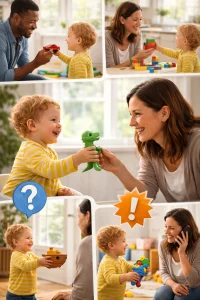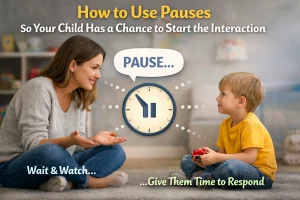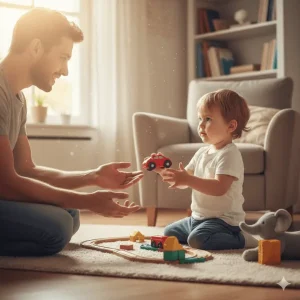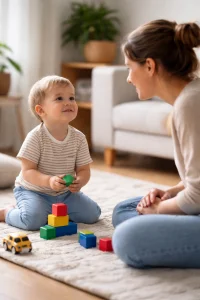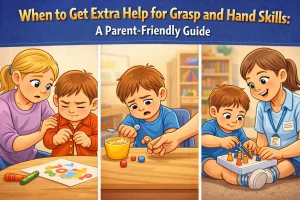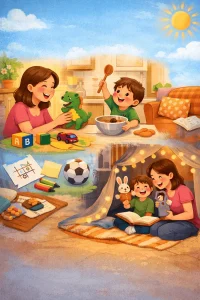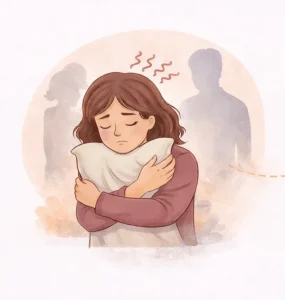My Baby Isn’t Talking or Imitating – When to Get Help
By Rajini D
Last Updated: June 11, 2025
It’s natural to wonder, “Should my baby be saying more by now?” Maybe your baby is not talking, not babbling, not copying your words, or not responding when you wave — and deep down, you’re starting to feel concerned.
You might hear things like “It’s too early to worry” or “They’ll talk when they’re ready.” But as a parent, your instincts matter. If your baby is not talking, not imitating sounds, or not showing interest in communication, it’s okay to take a closer look.
Free Speech Help for Kids
Concerned about speech delays? Book a free consultation with our expert speech therapist and get guidance tailored to your child’s needs.
When Should a Baby Start Talking and Imitating Sounds?
If your baby isn’t talking or imitating yet, it’s natural to wonder if something might be wrong. But here’s the good news — you’re not alone, and asking these questions means you’re already on the right track.
Let’s look at what most babies typically do by certain ages:
| Age | Communication Milestones |
|---|---|
| 6 months | Makes cooing and babbling sounds, laughs, turns head toward sounds |
| 9 months | Copies simple sounds like “ba-ba”, uses gestures like waving or reaching |
| 12 months | Says 1–2 words like “mama” or “dada”, tries to imitate your words and actions |
| 18 months | Uses 10+ words, imitates words more clearly, follows simple directions |
Explore our Toddler Speech Development Guide to learn key milestones, what delays to watch for, and how to support your child at home.
What’s a Normal Variation?
Every baby is different — some talk early, others take their time. But if your baby isn’t babbling by 9 months or not trying to copy sounds or gestures by 12 months, it’s worth paying closer attention.
This doesn’t always mean there’s a serious problem. Sometimes it’s just a temporary delay. But spotting these signs early can make a big difference in how your child develops.
Watch Out for These Early Signs:
- Baby not babbling by 9–12 months
- Baby not copying sounds or facial expressions
- Baby not using gestures like waving, pointing, or reaching
- Baby not responding to their name by 12 months
Is It Normal If My Baby Isn’t Talking at 12 or 18 Months?
It’s a question many parents ask — “Should my 12-month-old be talking by now?” or “Why isn’t my 18-month-old speaking like other kids?” If you’re feeling unsure, you’re not alone. Let’s talk about what’s typical and what might need a closer look.
Realistic Expectations vs Red Flags
By 12 months, most babies say 1–2 simple words (like “mama” or “bye”) and try to imitate sounds. By 18 months, many are using 10–20 words and starting to name things around them.
But if your 12-month-old isn’t talking or babbling, or if your 18-month-old isn’t speaking more than a few words, it could be a sign of a late talking baby — especially if they’re also not pointing, waving, or copying you.
Red flags to watch:
- Not saying any words by 16–18 months
- Not trying to imitate or name familiar objects
- Not showing interest in communication (verbal or non-verbal)
Delayed Talking vs General Developmental Delay
Sometimes, speech is the only area that’s slow — this is called an expressive language delay. But in other cases, your child might also struggle with social skills, motor skills, or understanding language, which could point to a broader developmental concern.
This is why early evaluation matters. A speech therapist can help figure out if it’s just a language delay or part of something bigger — and support you either way.
Do Boys Talk Later Than Girls?
Yes, boys sometimes talk a little later than girls. But this isn’t a reason to ignore delays. Personality also plays a role — some quieter babies may prefer observing over speaking.
Still, if your child is 18 months old and not speaking or imitating, don’t assume it’s just a phase.
Also Read: Do Boys talk later than girls?
Why Isn’t My Baby Imitating or Copying Me?
If your baby isn’t imitating your actions, sounds, or even facial expressions, it’s natural to feel a little worried. Imitation is one of the earliest signs that your child is learning how to connect and communicate — and it plays a big role in speech development.
The Role of Imitation in Learning to Talk
Before a baby says their first real word, they copy what they hear and see. This might look like:
- Mimicking your smile or sticking out their tongue
- Repeating sounds like “ba” or “da”
- Clapping hands when you do
- Pointing or waving when you model it
Why Your Baby Might Not Be Copying You
Here are a few common reasons:
- Hearing difficulties: If a baby can’t hear clearly, they won’t copy sounds well.
- Lack of interaction: Babies need lots of back-and-forth play, face time, and talking to spark imitation.
- Developmental concerns: Sometimes a delay in copying actions can be an early sign of speech delay, social communication difficulties, or conditions like autism.
Read more: Early Signs of Autism in Children: 7 Key Indicators
What You Can Try at Home
You don’t need fancy tools to encourage imitation. Here are a few simple things you can do:
- Get face-to-face with your baby — eye contact matters
- Sing songs with actions (like “Wheels on the Bus”)
- Make fun sounds and pause — give them time to copy
- Use big, clear gestures like waving or clapping
- Gently call their name — notice if they turn or respond
Signs Your Baby May Need a Speech Therapist
Wondering, “Does my baby need speech therapy?” You’re not alone — many parents notice something feels a little “off” before anyone else does. Trust that instinct. Spotting the signs of speech delay early can make a huge difference in your child’s development.
Signs of Speech or Communication Delay
If you notice any of these signs, it may be time to check in with a speech therapist:
| Age | Signs to Watch |
|---|---|
| 6–9 months | Not babbling (“ba-ba”, “da-da”) Doesn’t smile or make eye contact Rarely responds to sounds |
| 10–12 months | Not imitating sounds or gestures Doesn’t respond to name No attempt to use simple words like “mama” or “bye” |
| 13–18 months | Less than 10–15 words Doesn’t point, wave, or nod Doesn’t try to repeat what you say |
Take our quick Speech and Language Development Test to understand where your child stands — and what to do next.
When Should I Be Concerned About Babbling or Imitation?
Babbling should typically start around 6 months. Imitating gestures (like waving or clapping) often begins by 9–12 months. If your child is not babbling, not copying, and not engaging with your voice or actions, these are red flags.
Here’s an easy way to remember:
No babble by 9 months = Check-in.
No words by 16 months = Get guidance.
No imitation = Act early.
When to Consult a Speech Therapist
You don’t need to wait for a diagnosis or major delay to speak with a professional. In fact, the earlier you ask, the easier it is to help your baby grow.
Some parents come in because:
- Their 15-month-old only makes sounds, no real words
- Their baby doesn’t copy waving or clapping
- They’re not sure if the baby understands simple phrases like “Come here” or “Give it to me”
What Does a Baby Speech Therapist Do?
If your baby isn’t talking or imitating yet, you might be wondering how a speech therapist for babies can actually help. It’s a fair question — after all, babies aren’t having conversations just yet. But that’s exactly where early support makes the biggest impact.
What Is the Role of a Baby Speech Therapist (SLP)?
A Speech-Language Pathologist (SLP) doesn’t just help with speech — they support all parts of early communication. For infants and toddlers, this includes:
- Encouraging babbling, gestures, and eye contact
- Building understanding of words and actions
- Supporting social connection and interaction
- Helping with feeding or sound production if needed
They use simple, play-based strategies to teach babies how to connect, respond, and eventually talk — step by step.
What Does Early Speech Therapy Look Like?
Early therapy doesn’t involve flashcards or drills. Instead, it feels like play — but with purpose. A therapist might:
- Use toys to spark imitation and joint attention
- Show parents how to model words during daily routines
- Guide the baby to make sounds, gestures, and choices
- Create a calm, engaging space where the baby feels safe and responsive
Therapy is often just 30–45 minutes — and it’s fun for both baby and parent!
How Wellness Hub Supports Early Intervention
At Wellness Hub, we make speech therapy for infants warm, personalized, and easy to access — especially for parents who want help early, not wait for a diagnosis.
Here’s what sets our approach apart:
- Goal-based plans tailored to your baby’s strengths
- Parent involvement — you learn how to support your baby every day
- Online therapy sessions, perfect for busy families in India and abroad
- Gentle, play-first methods that feel natural and encouraging
What You Can Do at Home to Help Your Baby Talk and Imitate
You don’t need special tools or complicated techniques to encourage your baby to talk. In fact, the best place to start is right at home — during your everyday routines. With a few simple changes, you can turn daily moments into powerful chances to build communication.
Talk During Daily Routines
Talking to your baby while you dress them, feed them, or go for a walk might seem small — but it’s one of the most effective ways to help your baby imitate sounds and learn new words.
Say things like:
- “Let’s put on your socks — one, two!”
- “Look! It’s your teddy bear!”
- “Mama’s opening the door… open!”
Use short, clear sentences and repeat them often. Your baby is listening and learning — even before they speak.
Read and Sing Every Day
Books and songs are perfect for babies — especially ones with repetition, rhymes, or actions. Choose simple board books and sing classic songs like:
- “Twinkle Twinkle Little Star”
- “Row Row Row Your Boat”
- “If You’re Happy and You Know It”
These help your child hear patterns, follow actions, and copy sounds in a fun, relaxed way.
Use Gestures and Facial Expressions
Before babies talk, they communicate with their bodies. Pointing, waving, clapping — these are all big steps toward speech. You can model them often:
- Wave and say “bye-bye”
- Clap and cheer when something exciting happens
- Point to objects and name them: “Look, a ball!”
Using expressive faces and clear gestures helps your baby understand and feel connected — both are key for speech growth.
Try Face-to-Face Interaction
Babies learn best from watching your mouth, eyes, and emotions. Spend a few minutes each day getting on their level — sit face-to-face, smile, talk slowly, and wait for their response.
When to Get Help — And Why Early Support Matters
If your baby isn’t babbling, not copying you, or saying any words yet, you might hear things like “They’ll grow out of it” or “Let’s wait and see.” While this advice is often meant to comfort, it can sometimes lead to unnecessary delays in getting the right support.
Why “Wait and See” Can Be Risky
Speech and communication skills are building blocks that develop quickly in the first two years of life. If those early signs are missing, waiting too long can make things harder — both for your child and for you.
Getting early speech therapy doesn’t mean something is “wrong.” It means you’re giving your baby the tools to catch up at the right time — when their brain is most ready to learn.
How Early Help Changes Everything
Research shows that the earlier a child receives support, the better their long-term results — in speech, learning, and social connection. Early therapy is:
- Gentle and play-based
- Easier to start when delays are mild
- More effective before habits form or frustration sets in
It’s not about speeding things up. It’s about giving your baby the right support at the right time.
Conclusion
If you’ve been feeling unsure about your baby’s speech — trust that inner voice. You’re not overreacting. You’re noticing the early signs that matter most. Sometimes, delays seem small in the beginning. But the truth is, speech milestones don’t always “catch up” on their own — especially if your baby is not talking or showing interest in copying sounds or gestures. The earlier you step in with the right support, the easier it is to help your child thrive. You don’t need to have all the answers right now. You just need a place to start.
At Wellness Hub, we’re here to walk this journey with you — with gentle, personalized care designed for babies and toddlers who need early support for speech delay. Whether you’re ready to begin or simply want to understand your child better, we’re just a click away.
Frequently Asked Questions:
1. Is it normal if my 12-month-old isn’t talking yet?
At 12 months, many babies start saying simple words like “mama” or “dada.” But if your child isn’t saying any words or even trying to babble or copy sounds, it could be an early sign of a speech delay. Every child develops at their own pace, but if your baby seems much quieter than others, it’s worth looking into early support.
2. When should I be worried if my baby is not talking?
You should start paying attention if your baby is not babbling by 9 months, not saying any words by 16 months, or not combining words by 2 years. If your baby also isn’t copying actions or responding to their name, these are clear signs that they may need help from a speech therapist. Getting help early can really improve outcomes.
3. Why is my baby not imitating or copying me?
Babies usually begin to imitate sounds and actions between 9 and 12 months. If your baby isn’t copying gestures like waving, clapping, or trying to repeat simple sounds, it might be a sign of a communication delay. Imitation is an important step before talking, so if it’s missing, consider speaking to a professional for advice
4. Does my baby need a speech therapist?
If you’re asking this question, it means you’re noticing something — and that’s important. If your baby doesn’t respond to sounds, doesn’t try to babble, or isn’t using gestures or simple words by 18 months, then they may benefit from early speech therapy. A speech therapist can help you understand what’s going on and show you simple ways to support your baby.
5. Can a baby get speech therapy before they start talking?
Yes! Speech therapy for infants doesn’t mean formal lessons or pressure. It’s fun, play-based, and focuses on teaching early skills like eye contact, listening, babbling, and using gestures. These are the building blocks of language. The earlier a child gets support, the easier it is to build strong communication skills.
6. What are early signs of speech delay in babies?
Here are a few red flags to watch for:
- Not babbling by 9–10 months
- Not responding to name by 12 months
- Not saying any words by 16–18 months
- Not using gestures like waving or pointing
- Not trying to copy sounds or actions
If you notice several of these signs, it’s a good idea to speak with a speech therapist for babies.
7. Is speech delay common in babies?
Yes, speech delay is one of the most common developmental concerns in toddlers. Some children simply take longer to speak, while others may need extra help. The key is to act early, so your baby doesn’t fall further behind.
8. Do boys talk later than girls?
It’s true that some boys talk a little later than girls, but that doesn’t mean delays should be ignored. If your son isn’t babbling, imitating, or using words by 18 months, don’t assume it’s just “a boy thing.” It’s better to get a professional opinion and be sure.
9. Can I help my baby talk at home?
Absolutely! Parents play a big role in building early communication. You can:
- Talk to your baby during daily activities
- Read picture books together
- Sing songs with actions
- Use clear gestures like waving and pointing
- Play face-to-face games
These simple activities can encourage your baby to talk and imitate naturally. You can also follow these home strategies recommended by our therapists.
10. Where can I get help if my baby isn’t talking?
If you’re worried about your baby’s speech or imitation, you don’t have to wait or guess. At Wellness Hub, you can book a free consultation with a child speech expert. We help parents understand early delays and offer personalized, gentle therapy programs designed just for babies and toddlers.
About the Author:
Rajini Darugupally
M.Sc., Speech-Language Pathologist (9+ years of experience)
Rajini is a passionate and dedicated Speech-Language Pathologist with over 9+ years of experience, specializing in both developmental speech and language disorders in children and rehabilitation in adults. Driven by a desire to empower each individual to find their voice, Rajini brings a wealth of experience and a warm, genuine approach to therapy. Currently, at Wellness Hub, she thrives in a team environment that values innovation, compassion, and achieving results for their clients.
Book your Free Consultation Today
Parent/Caregiver Info:
Client’s Details:
* Error Message
